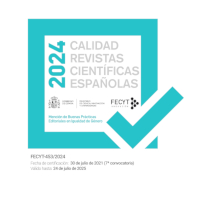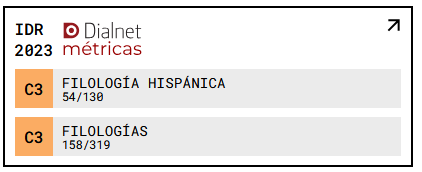The disputed poet
Readings about César Vallejo in the Spanish republican exile and in the Spanish postwar period
DOI:
https://doi.org/10.18172/cif.5330Keywords:
César Vallejo, Spanish postwar period, Spanish republican exile, Juan Larrea, Leopoldo Panero, José María ValverdeAbstract
After the Spanish Civil War, a direct confrontation was established between the cultural narrative proposed by the republican exile and the one constructed from Franco's Spain, either from the government or from its margins. This confrontation of stories directly affected the reception of a series of authors of the so-called “Edad de plata”. One of these disputed references was the Peruvian poet César Vallejo. His enormous influence both among the members of the “Veintisiete” and the “Treintayséis” led to his claim from exile platforms such as España peregrina and from the environment of intellectual Falangism and magazines such as Escorial or Cuadernos Hispanoamericanos. In this way, prominent members of both environments such as Juan Larrea and Leopoldo Panero wanted to bring the author of Trilce closer to not only his aesthetic but also ideological postulates. At the same time, a series of intellectuals outside the Franco government wanted to offer their own reading of Vallejo's legacy from Spain.
Downloads
References
ALONSO, D. (1944). “Federico García Lorca y la expresión de lo español”. En Ensayos sobre poesía española. Madrid, Revista de Occidente. Citamos desde Alonso (1965), Poetas españoles contemporáneos. Madrid, Gredos, pp. 257-265.
ÁVILA GONZÁLEZ, F. J. y SCHNABEL, D. R. (1988). “Vallejo y Rosales”. Cuadernos Hispanoamericanos, 454-455, 113-126.
BOUSOÑO, C. (1966). Teoría de la expresión poética. Madrid, Gredos (4ª ed.).
CANO BALLESTA, J. (1972). La poesía española entre pureza y revolución (1930-1936). Madrid, Gredos.
CRÉMER, V. (1978). “¡Espadaña a la vista! (El resplandor de las cenizas)”. En Espadaña. Revista de poesía y crítica. Edición facsímil. León, Espadaña Editorial, pp. XIX-XXXI.
DEL RÍO, Á. (1948). Historia de la literatura española. Vol. II Desde 1700 hasta nuestros días. New York, The Dryden Press.
ESPAÑA PEREGRINA 1(1940), 3-6.
FÉRRIZ ROURE, T. (2002). Estudio de España Peregrina (1940). Una revista para la continuación de la cultura española en el exilio mexicano. Alicante, Biblioteca Virtual Miguel de Cervantes.
GUTIÉRREZ CARBAJO, J. (1988). “Presencia de Vallejo en la poesía española de posguerra”. Cuadernos Hispanoamericanos, 454-455, 197-214.
IÁÑEZ PAREJA, E. (2008). Falangismo y propaganda cultural en el Nuevo estado: la revista Escorial (1940-1950). Granada, Universidad de Granada. Tesis doctoral.
LARREA, J. (1940a). “Profecía de América”. España peregrina, 1, 20.
LARREA, J. (1940b). “Memoria de César Vallejo”. España peregrina, 3, 121-124.
LARREA, J. (1973). César Vallejo héroe y mártir indohispano. Montevideo, Biblioteca Nacional.
NÚÑEZ, E. (1988). “Vallejo y España: una doble perspectiva”. Cuadernos Hispanoamericanos, 454-455, 215-220.
PANERO, L. (1945). Antología de la Poesía Hispanoamericana. Tomo II. Desde Rubén Darío hasta nuestros días. Madrid, Editora Nacional.
PANERO, L. (1948). “César Vallejo”. Cuadernos hispanoamericanos, 2, 299-300.
RIDRUEJO, D. (1940). “El poeta rescatado”. Escorial, 1, 94-99.
RIVERO MACHINA, A. (2013). “La cuestión Lorca en el debate periodístico y literario hispánico del medio siglo”. En Fidel López Criado (ed.), La cuestión social. Literatura, cine y prensa. Santiago de Compostela, Andavira, pp. 249-256.
RIVERO MACHINA, A. (2015). “Leopoldo Panero y su antología de poesía hispanoamericana. Una lectura personal de América”. Anales de literatura hispanoamericana, 44, 423-441. DOI: https://doi.org/10.5209/rev_ALHI.2015.v44.51522
RODRÍGUEZ PADRÓN, J. (1988). “Presencia y permanencia de Vallejo”. Cuadernos Hispanoamericanos, 454-455, 127-166.
SABUGO ABRIL, A. (1988). “Vallejo y Larrea, o las afinidades electivas”. Cuadernos Hispanoamericanos, 454-455, 39-56.
TORRENTE BALLESTER, G. (1940). “Presencia en América de la España fugitiva”. Tajo. Semanario de política, letras, arte, economía, deporte y humor, 10, 5.
VALENTE, J. Á. (1971). Las palabras de la tribu. Madrid, Siglo XXI.
VALVERDE, J. M. (1948). “Horizonte hispánico de la poesía”. Cuadernos Hispanoamericanos, 1, 129-133.
VALVERDE, J. M. (1949a). “Notas de entrada a la poesía de César Vallejo”. Cuadernos Hispanoamericanos, 7, 57-84.
VALVERDE, J. M. (1949b). “César Vallejo y la palabra inocente”. Escorial, 62, 379-405.
VIVANCO, L. F. (1942). “La poesía de Unamuno”. En Miguel de Unamuno, Antología poética, Luis Felipe Vivanco (ed.). Madrid, Escorial, pp. 3-18.
WAHNÓN, S. (1995). “La recepción de García Lorca en la España de la posguerra”. Nueva revista de filología hispánica, 43-2, 409-430. DOI: https://doi.org/10.24201/nrfh.v43i2.1884
Downloads
Published
How to Cite
Issue
Section
License
Copyright (c) 2022 Antonio Rivero Machina

This work is licensed under a Creative Commons Attribution 4.0 International License.
The authors retain copyright of articles and authorize CIF the first publication. They are free to share and redistribute the article without obtaining permission from the publisher as long as they give appropriate credit to the editor and the journal.
Self-archiving is allowed too. In fact, it is recommendable to deposit a PDF version of the paper in academic and/or institutional repositories.
It is recommended to include the DOI number.
This journal is licensed under a Creative Commons Attribution 4.0 International License














